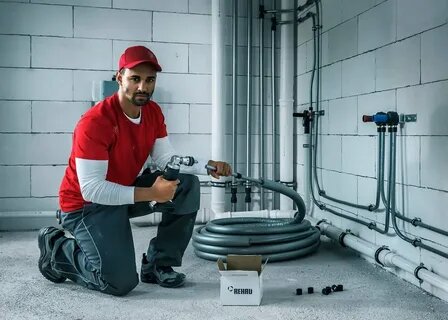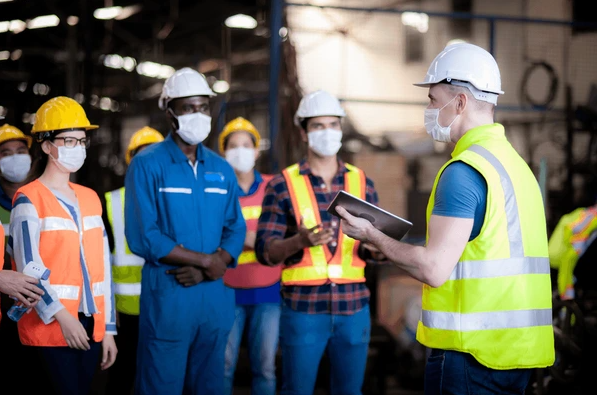Effective plumbing systems are crucial for warehouse operations, ensuring that essential functions such as restrooms, waste management, and equipment cooling run smoothly. Warehouses often face unique plumbing challenges due to the high volume of water use, industrial equipment requirements, and the sheer size of these facilities. Knowing how to troubleshoot and resolve common plumbing issues in warehouses—and when to call in a professional Commercial Plumber—can save time, reduce operational costs, and help avoid downtime. This guide provides insights into fixing common plumbing issues in warehouses and highlights how expert help from ADS Wales can make all the difference.
1. Understanding Common Plumbing Challenges in Warehouses
Warehouses present unique challenges for plumbing systems, often due to the heavy demands placed on water supply lines, drainage, and specialized equipment.
a. High Water Demand
Warehouses frequently use large volumes of water for cleaning, cooling, and sanitization. Ensuring consistent water flow and proper pipe sizes to handle this demand is critical.
b. Complex Drainage Needs
In addition to standard drainage, warehouses often have floor drains, industrial wastewater requirements, and other unique drainage setups that may lead to frequent clogs if not well-maintained.
c. Vulnerability to Temperature Variations
Warehouses tend to have large, open spaces with less insulation, making plumbing systems more susceptible to temperature changes, which can lead to freezing or bursting pipes.
d. Equipment-Related Plumbing Needs
Many warehouses operate equipment that requires water connections or cooling systems. This adds complexity to the plumbing system, as equipment malfunctions can lead to leaks or other water-related issues.
2. Diagnose the Plumbing Issue Early
Knowing how to identify early signs of plumbing issues can prevent minor problems from escalating. Here are some common symptoms to watch for in a warehouse setting:
a. Inconsistent Water Pressure
Low or fluctuating water pressure can indicate pipe blockages, leaks, or issues with the water supply line. This is especially problematic if machinery relies on consistent water pressure to operate effectively.
b. Unusual Sounds from Pipes
If you hear banging, whistling, or gurgling noises from pipes, there could be air trapped, sediment buildup, or water hammer issues, all of which require attention to prevent damage.
c. Persistent Drainage Issues
Slow drainage, backups, or bad odors from drains may indicate blockages or insufficient drainage capacity. In a warehouse, clogged drains can disrupt operations and lead to costly repairs if left unresolved.
d. Visible Leaks or Moisture Buildup
Leaks and moisture buildup can cause structural damage and mold, impacting warehouse inventory and overall air quality. Look for water stains, wet floors, or moldy areas around plumbing fixtures.
3. Essential Plumbing Repairs to Consider
Once you identify a plumbing issue, there are certain repairs and adjustments that are commonly needed in warehouse plumbing systems.
a. Pipe Repairs and Replacements
If you encounter frequent leaks or pressure issues, it may be time to repair or replace aging pipes. Warehouses with older plumbing systems are more prone to corrosion, cracks, or other damage due to continuous high-volume usage.
b. Clearing Clogs and Blockages
Clogs can quickly disrupt operations. If you experience frequent backups, enlist the help of a plumber to remove clogs professionally. For heavily trafficked areas, consider installing strainers or drain guards to prevent debris from entering drains.
c. Fixing Leaks in Valves and Joints
Over time, wear and tear can cause leaks in pipe joints or valves, leading to water loss and higher utility costs. Regularly inspect these areas, and replace faulty parts as soon as issues are detected.
d. Adjusting or Replacing Pressure Regulators
A pressure regulator controls the flow and pressure in pipes, ensuring that water pressure is stable. Replacing or adjusting regulators in high-traffic warehouse areas is essential to prevent pipe strain and potential bursts.
4. Preventative Maintenance for Warehouse Plumbing
Preventative maintenance keeps plumbing systems functioning optimally and prevents breakdowns that could disrupt warehouse operations.
a. Regular Pipe Inspections
Scheduling regular inspections can detect issues before they escalate. Plumbers will check for corrosion, leaks, or weak spots that may need reinforcement or replacement.
b. Routine Drain Cleaning
Blocked drains are a common warehouse issue. Routine drain cleaning with hydro-jetting or snaking methods removes debris buildup and maintains proper drainage.
c. Insulating Pipes
For warehouses in cold climates, insulating pipes can prevent freezing during winter. Uninsulated pipes in a warehouse are more likely to burst due to extreme temperature fluctuations.
d. Installing Backflow Prevention Systems
Backflow prevention devices protect warehouse plumbing from contamination due to reverse water flow, which can occur in cases of low water pressure or during water main issues.
5. Why Hire a Professional Plumber for Warehouse Plumbing Repairs
While in-house maintenance teams may handle minor repairs, complex warehouse plumbing issues often require professional expertise. Here’s why working with a specialized commercial plumbing service like ADS Wales is beneficial.
a. Advanced Diagnostic Equipment
Professional plumbers use advanced equipment, such as video pipe inspection and leak detection tools, to accurately locate issues without invasive measures. This saves time and ensures accurate problem-solving.
b. Expertise in Industrial and Commercial Plumbing
Commercial plumbers understand the demands of warehouse plumbing, including code compliance, equipment maintenance, and managing high-volume water use. They’re equipped to address issues unique to industrial environments.
c. Time-Saving and Cost-Effective Solutions
A professional plumber can resolve issues quickly and efficiently, minimizing downtime. Professional repairs reduce the risk of future problems and eliminate the need for frequent maintenance, which saves costs in the long run.
d. Up-to-Code Repairs and Installations
Commercial plumbing systems must meet specific standards to be safe and efficient. Professional plumbers ensure all repairs, replacements, and installations adhere to local codes, protecting your warehouse from compliance issues and fines.
6. Upgrading Warehouse Plumbing Systems
If your warehouse consistently experiences plumbing problems, it may be time for an upgrade. Updating old systems improves efficiency, safety, and water conservation, reducing long-term costs.
a. High-Efficiency Fixtures
Installing high-efficiency toilets, faucets, and water heaters reduces water consumption and energy use. These upgrades also reduce strain on the plumbing system, extending the life of pipes and fittings.
b. Automated Water Control Systems
Automated control systems detect leaks, manage water pressure, and monitor usage. These systems send alerts about issues in real-time, allowing you to respond quickly to avoid extensive damage.
c. Pipe Replacement with Durable Materials
Replacing old pipes with corrosion-resistant materials, such as PEX or CPVC, can prevent leaks and withstand higher pressures, which are essential for high-demand environments like warehouses.
d. Rainwater Harvesting Systems
If your warehouse has significant outdoor spaces or landscapes, consider a rainwater harvesting system. Rainwater can be repurposed for irrigation, cleaning, or even cooling processes, reducing dependency on municipal water.
7. How to Optimize Warehouse Plumbing for Efficiency
Implementing plumbing practices that enhance efficiency can reduce costs and contribute to smoother operations.
a. Reduce Water Pressure in Low-Traffic Areas
Lowering water pressure in areas with less foot traffic prevents excess water use and extends the life of plumbing fixtures. Adjust pressure in high-demand areas separately to maintain consistency.
b. Install Water Flow Control Devices
Installing flow control devices on faucets and toilets regulates water usage and minimizes waste. These devices ensure water flow is consistent, reducing the risk of leaks or overuse.
c. Implement Scheduled Maintenance Plans
Scheduling regular maintenance with a commercial plumber ensures pipes, fixtures, and drainage systems are routinely checked and maintained. Professional maintenance services, like those offered by ADS Wales, can be customized to meet specific warehouse needs.
d. Utilize Smart Monitoring Systems
Smart water monitoring devices provide real-time data on water usage, pressure, and flow. This technology detects issues instantly, alerting management before problems escalate.
8. Emergency Plumbing Preparedness for Warehouses
Emergencies can arise unexpectedly, and a plan for dealing with sudden plumbing failures is essential for warehouses.
a. Develop an Emergency Response Plan
Identify the locations of shut-off valves, main water supply lines, and emergency contacts. Training warehouse staff on emergency response procedures ensures swift action when a plumbing issue arises.
b. Maintain Backup Systems for Critical Operations
Consider backup systems for critical areas that rely heavily on water, such as cooling systems for temperature-sensitive goods. Backup pumps and reservoirs prevent disruptions in case of plumbing failures.
c. Have a 24/7 Commercial Plumber on Call
Warehouses often operate 24/7, so partnering with a plumbing service like ADS Wales that offers emergency support ensures quick response to any urgent plumbing situation, minimizing downtime and potential losses.
9. Choosing the Right Plumbing Partner for Warehouse Needs
Selecting the right plumber is key to ensuring effective and efficient service. A company specializing in commercial plumbing will understand the unique needs of warehouses and provide the expertise required to resolve complex issues.
a. Look for Experience in Commercial Plumbing
Choose a plumbing company with a strong track record in commercial and industrial plumbing. This experience equips them to handle larger, more demanding systems like those in warehouses.
b. Prioritize Licensed and Certified Professionals
Ensure the plumber is licensed and certified to work in commercial settings. Certifications and licenses indicate they have the skills and knowledge to meet industry standards.
c. Opt for a Service with Preventative Maintenance Plans
Choose a plumber who offers customized maintenance plans to prevent future problems. Regular maintenance can reduce repair costs and prolong the life of your plumbing system.
Conclusion
Maintaining a functional and efficient plumbing system in a warehouse is essential for operational success. Identifying issues early, implementing preventative maintenance, and partnering with a commercial plumbing expert like ADS Wales can help address plumbing challenges and prevent disruptions. By upgrading systems, conducting regular inspections, and optimizing water use, warehouse managers can keep plumbing systems efficient, environmentally friendly, and cost-effective.




